England fans are seen as knuckle-dragging idiots – reality in Germany is very different
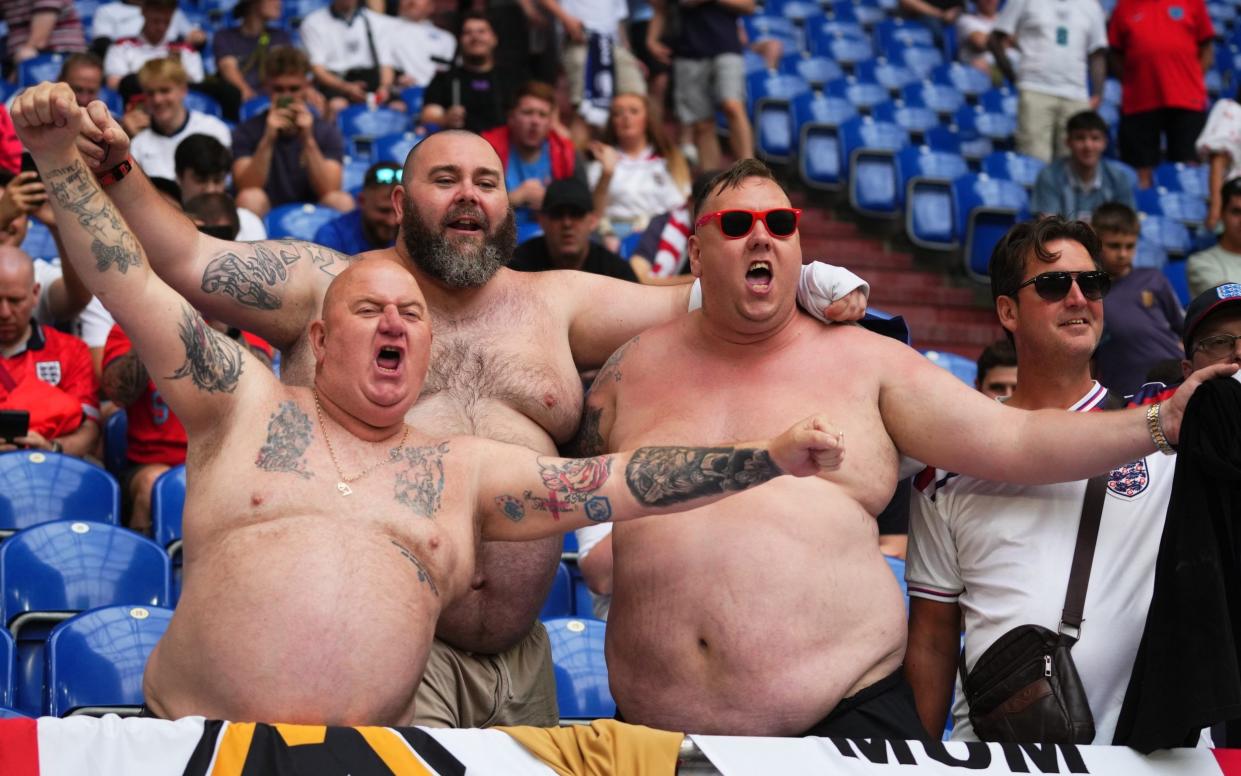
Half an hour before England’s European Championship begins, the DJ at Trabrennbahn Gelsenkirchen gets serious. There is space for 40,000 fans at this racecourse-turned-fanzone but punishing rain and an exodus to the stadium has thinned the crowd. Perhaps 2,000 remain and the site now resembles Glastonbury on the Sunday of a wet year.
Many pairs of trainers are ruined, but when the opening piano chords of Don’t Look Back In Anger arrive there is nowhere these fans would rather be. Arms are raised, words are screamed, suddenly there are a dozen people on their mates’ shoulders. Then the football starts. Ninety minutes later, despite a 1-0 win against Serbia the wedding reception euphoria has evaporated.
If you could prolong the feeling inside German fanzones before England games and successfully sneak it back through customs the nation would be in a permanent state of 1996-style summer bliss. Few fancied Russia in 2018 or Qatar in 2022 and Euro 2021 was the Covid-blighted pan-European edition, so this is the first time England’s support has travelled in their usual large number since France 2016. Compared to then, when most conversations with those wearing three lions felt like they could turn nasty at speed, the mood in Germany has been delightful.
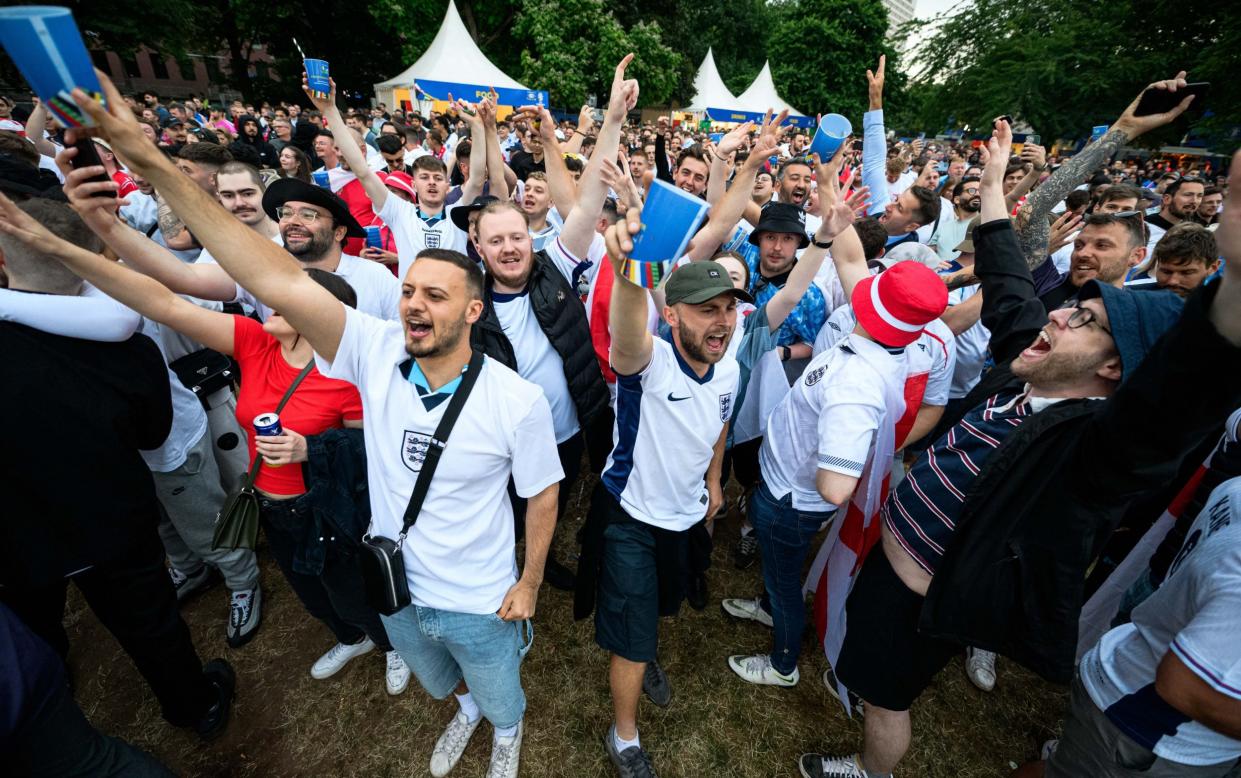
England’s support has changed. They were so feared in the World Cup of 1990 they were quarantined on the island of Sardinia. They rearranged the street furniture of Charleroi in 2000 then showed they were capable of similar at home in 2021 when the Euros final came to Wembley. Thankfully there has been little evidence of misbehaviour this summer. Arrests around games have been in single figures.
Demographically there is little obvious difference between the class of 2024 and their predecessors. The FA says the largest age group in the England Supporters Travel Club is 18-35 and predictably it is a large male majority, although female membership is increasing. Certainly there look to be a few more kids along for the ride than in France eight years ago, and certainly a small increase in ethnic minority fans.
Overwhelmingly though the average fan is still presented as a knuckle-dragger. The cohort which make for good backgrounds to TV bulletins is the Spitfires at dawn AM pint crew who have taken over town squares. Not all have heeded the plea to retire the naff song about 10 German bombers, but I am yet to see a trace of anger from any nearby Germans when it has been aired.
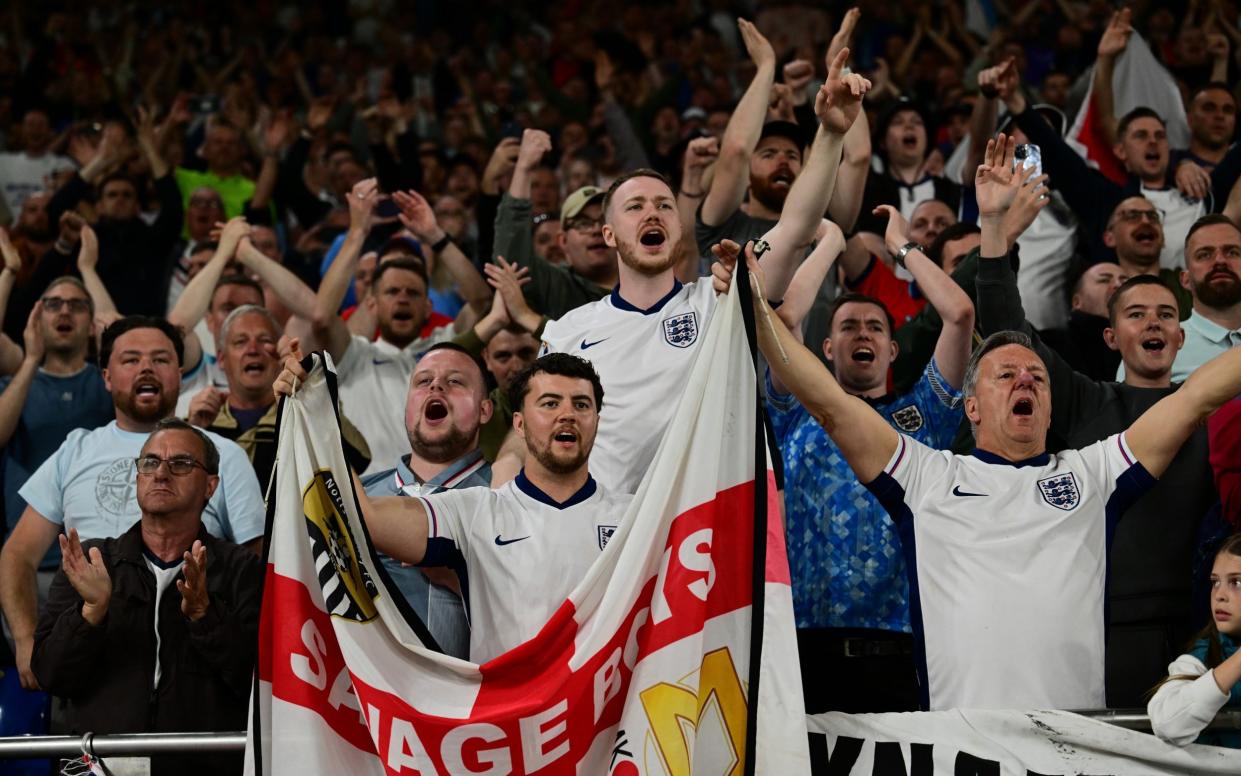
Plenty of others swerve the booze-first football-second approach to watching England and might engage in more traditional tourism. Simon Harris, who has been following England at tournaments since France 98, speaks highly of the Kunstpalast gallery in Dusseldorf. “I wouldn’t say the make-up of the fans has changed massively which is probably something to do with how much it costs. It’s the same group of young guys out on a staggy-type do and middle aged people like me who enjoy travel and football.
“It’s just regular people going out for a bit of an escape. But I think the policing has got significantly better and a lot more tolerant. Where it goes horribly wrong is often at the policing level.” The contemporary approach is softly-softly, quiet words with the most lairy supporters from plain-clothes officers, rather than the frequent foreign greeting of dozens of cops dressed (and armed) for a riot.
Banning orders, which forbid high-risk fans from attending games, have helped. In Greater Manchester before the tournament 152 people were forced to surrender their passports to police, preventing them from travelling. Many regular fans feel this minority are given undue prominence in coverage of England abroad.
“It’s the one per cent who are reported on, the 99 per cent aren’t,” says George Broadbent, lingering just outside Gelsenkirchen’s unlovely train astation. That is not to deny that there are still some troublemakers. “The majority of fans are pretty decent guys but there is always an element of dodgy characters running around,” says Broadbent’s friend Alan Weatherley. “If there’s a bit of trouble kicking off they’re always ready to respond and very happy to go and join in. I don’t think necessarily it is a bad press because it’s pretty honest, that’s what it’s like.”
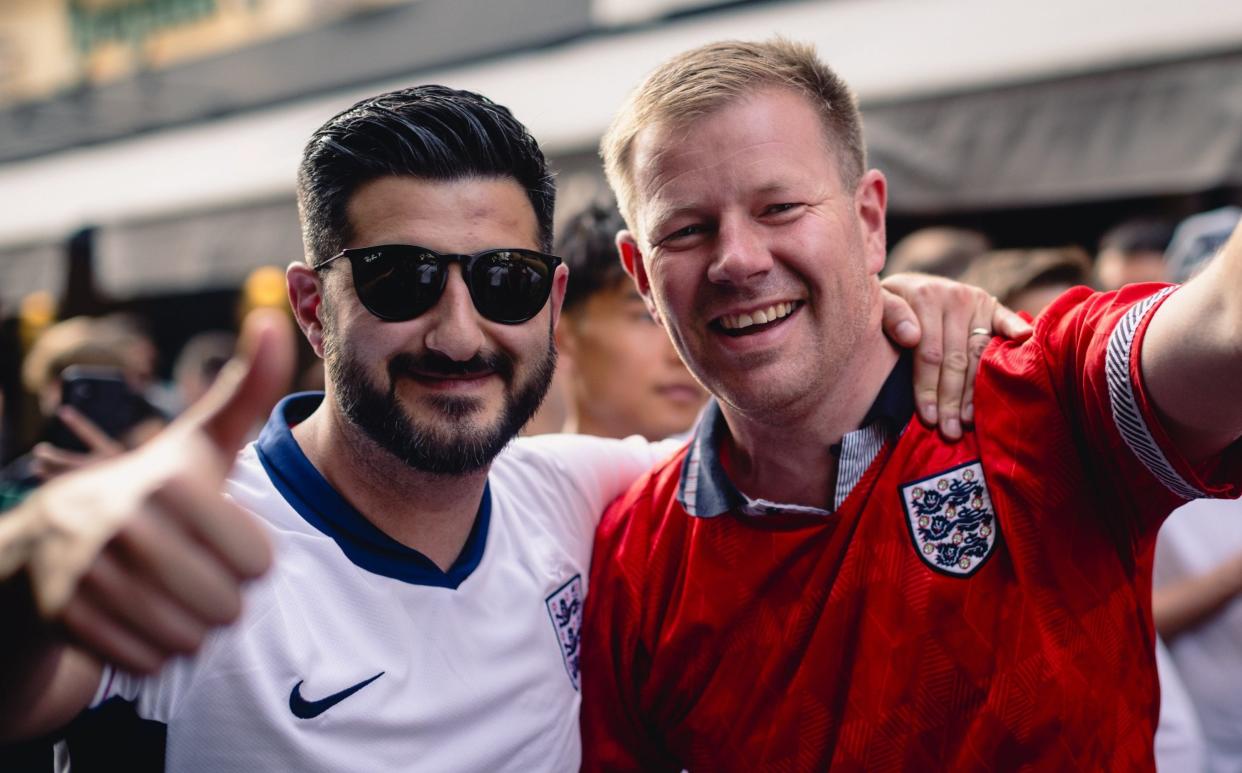
There is some self-policing at work, like the unspoken rule that if you are wearing a shirt it should only be England, not your club’s. This prevents local rivalries muddling support for the country. Those local allegiances are displayed instead on custom-made St George’s flags.
Shirts and flags were a controversial topic after Nike’s “playful update” of the cross on the back of the new home shirt. Talk of a boycott seems overstated though, the new shirts are comfortably the most popular behind the evergreen 1990 set. One older gentleman on a train into Dusseldorf gave a sermon to his party about not wearing “that gay flag,” but few seemed to be paying him much attention.
Chris Beech was in the Trabrennbahn fanzone on a reunion trip friends he met 25 years ago at Birmingham University. All were wearing new shirts. “The bigger issue with the shirt is how much it costs, not what flag is on the back.”
“We’ve been struggling to display our shirt proudly,” says his friend Tim Forshew. “We’re proud Englishmen but we don’t want to be seen as antagonising.”
“We’re conscious of the Brits abroad stereotype and we’re conscious not to play into that,” says Beech.
Later I catch non-Scouse Liverpool fan Luke O’Connor, flag draped over his shoulders on his way to the match. “I’m fairly patriotic. I can see why people moan about it but to be honest I think the kit looks smart. It doesn’t bother me too much really. It’s not the end of the world is it? It’s only a couple of colours.”
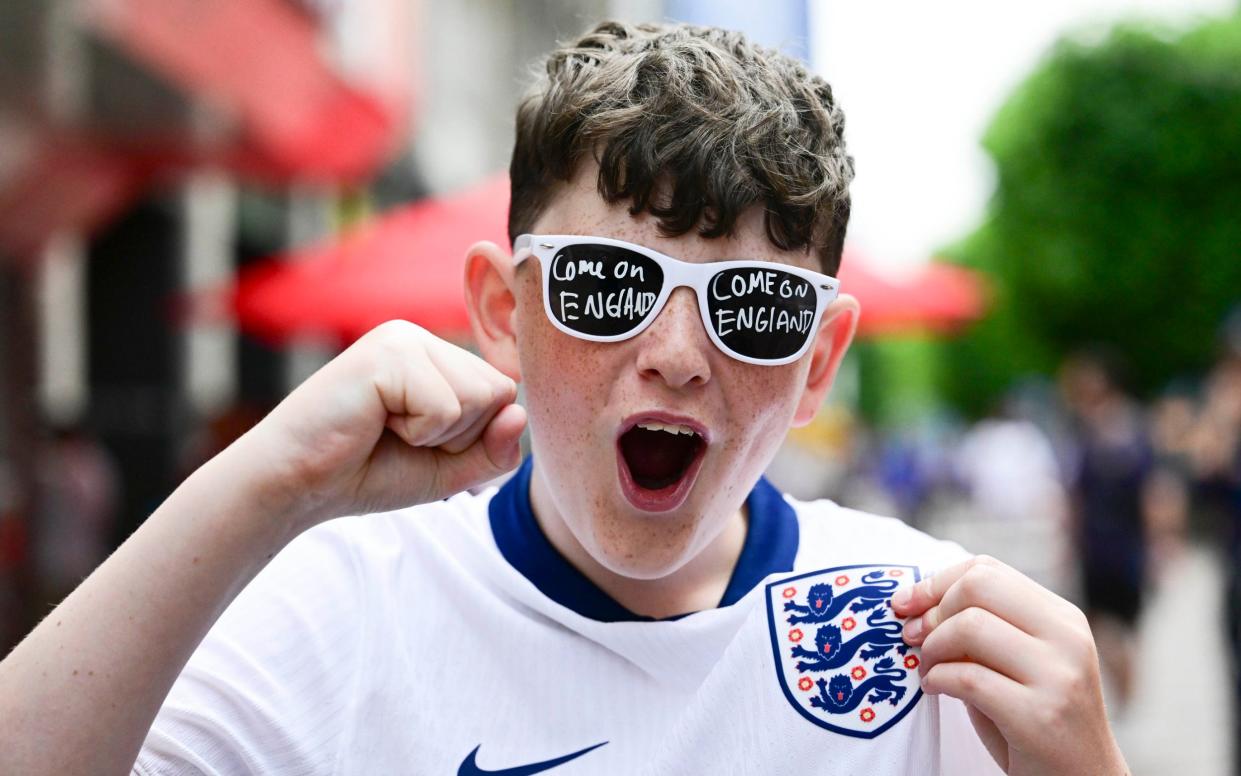
Stronger opinions are available about the England manager, especially after England’s group stage performances drop from tedious to alarming. Gareth Southgate has somehow gone from waistcoated hero to beer-cup target after his team drew with Slovenia. John Hemmingham has been following England home and away for 26 years and is leader of the England band. We speak ahead of the round of 16 match against Slovakia: “When we win the tournament Gareth Southgate will become Sir Gareth and everyone will love him. One great performance and the critics will turn into fans.”
Others are more vocal (and sweary) about the manager’s perceived shortcomings but the vitriol seems more profound at home than out here. Of course the Slovakia performance was largely dreadful, but a Jude Bellingham overhead kick will go a long way to erasing that memory when you see it with your own eyes.
Clearly England fans are not perfect. There is an undeniable aggression to the planting of flags, the scaling of tables and the yelling of songs with rude words in overseas cities, but most other countries’ supporters at this Euros have their own territory-marking version of this behaviour. Cocaine use is widespread, occasionally blatant and some carry on drinking way past the point where supporters from elsewhere would stop. These are societal issues though, hardly unique to football.
It strikes me that the reputation of the average England fan has been coloured by a lingering establishment distaste for football supporters as a whole. English people consuming English coverage of English fans with all of the attendant national shame. Presumably there is similar outrage in the Netherlands at the supporters who wore blackface in Ruud Gullit fancy dress or in Serbia for fans filmed singing in support of Vladimir Putin? Perhaps not.
We seem unusually keen to peer down our noses at the people who follow the national team. As a result, fans are attacked from both ends, people who mistrust patriotism of any kind and the self-appointed standard bearers who love their country but in a more solemn way, with fewer Fratellis singalongs. On the evidence of this tournament it is time to reassess. Cut England fans some slack.


